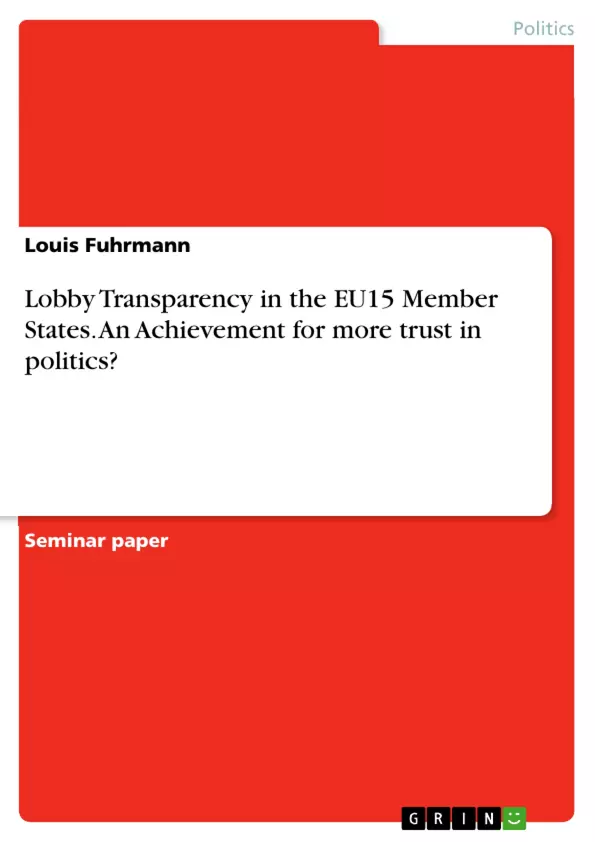The past scandals of the CDU in Germany have shown: Lobbyism is a serious problem if it operates under the wrong conditions. Even if the cases of Phillipp Amthor and the recent mask affairs of individual CDU/CSU members of parliament can be attributed to corruption, calls have been raised in Germany for mandatory registration. Lobbying has such a bad image in society that industry and associations in Germany have already independently joined forces in an initiative for a lobby register.
But does a transparency offensive on the part of politicians lead to increased public trust? This paper aims to precisely answer this question. It is based on the hypothesis that the stricter the regulation, the greater the public's trust in politics.
Corporatism is used as the theoretical basis for the investigation necessary to answer this question. Subsequently, the concept of lobbying will be defined and distinguished from corruption. Furthermore, it will be shown how transparency and lobbying are connected and why this can have positive effects on the legislative process. The core of the thesis will be an examination of the Rule of Law Reports of the EU-15. The data on transparency proposals will be compared with survey results of the Eurobarometer to identify possible correlations.
Inhaltsverzeichnis (Table of Contents)
- Introduction
- Theoretical basis
- Corporatism
- Literature and research status lobbyism
- Definition: Lobbyism
- Distinction lobbyism and corruption
- The interconnection of transparency & accountability of democratic decision making
- Methodology
- Analysis
- Overview: Lobby Regulation in EU-15 Member states
- Transparency Regulation in the EU-15 member states
- Austria
- Belgium
- Denmark
- Finland
- France
- Germany
- Greece
- Ireland
- Italy
- Luxembourg
- Netherlands
- Portugal
- Spain
- Sweden
- Overview: Transparency Regulation
- Special Eurobarometer 502: Corruption
- Corruption in the national public institutions
- Links between business and politics
- Analysis results
- Conclusion
Zielsetzung und Themenschwerpunkte (Objectives and Key Themes)
This paper investigates the impact of lobby transparency regulations on public trust in politics within the EU-15 member states. It aims to determine whether stricter regulations lead to increased public trust. The hypothesis is that greater transparency fosters trust in political processes.
- The relationship between transparency and public trust in politics.
- The role of lobbyism in democratic decision-making.
- The impact of corporatism on political processes.
- Analysis of transparency regulations in EU-15 member states.
- Correlation between transparency regulations and public perception of corruption.
Zusammenfassung der Kapitel (Chapter Summaries)
The paper begins with an introduction that highlights the importance of lobby transparency, using recent scandals in Germany as examples. It then delves into the theoretical framework, focusing on corporatism as a model for understanding the interaction between the state and interest groups.
The paper proceeds to define lobbyism and differentiate it from corruption, emphasizing the crucial role of transparency in ensuring accountability. It then examines the connection between transparency and accountability in the legislative process, highlighting the potential positive effects of transparent lobbying.
The core of the thesis examines the Rule of Law Reports for the EU-15, comparing data on transparency proposals with survey results from the Eurobarometer to identify possible correlations between transparency regulations and public perception of corruption.
Schlüsselwörter (Keywords)
Lobbyism, transparency, accountability, public trust, corporatism, EU-15, Rule of Law Reports, Eurobarometer, corruption, political decision-making, interest groups.
Frequently Asked Questions
Does lobby transparency lead to more public trust in politics?
The paper investigates the hypothesis that stricter lobby regulations correlate with higher public trust. It compares transparency proposals with Eurobarometer data across EU-15 countries.
What is the difference between lobbying and corruption?
Lobbying is the legitimate representation of interests in the legislative process, whereas corruption involves illegal acts for personal or group gain. Transparency helps distinguish the two.
What is corporatism in the context of this study?
Corporatism is the theoretical basis used to analyze how organized interest groups and the state interact in political decision-making processes within the EU-15.
How do lobby registers affect the democratic process?
Mandatory registers increase accountability by making it clear who is influencing legislation, which can improve the quality and legitimacy of the legislative process.
Which countries are part of the EU-15 analysis?
The analysis includes Austria, Belgium, Denmark, Finland, France, Germany, Greece, Ireland, Italy, Luxembourg, Netherlands, Portugal, Spain, Sweden, and the UK (as per the EU-15 definition).
- Quote paper
- Louis Fuhrmann (Author), 2021, Lobby Transparency in the EU15 Member States. An Achievement for more trust in politics?, Munich, GRIN Verlag, https://www.hausarbeiten.de/document/1192275


